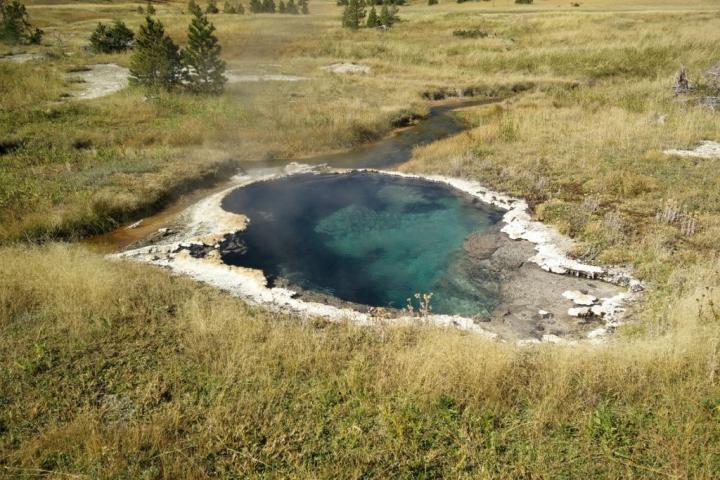
Credit: WSU
Last August, Abdelrhman Mohamed found himself hiking deep into the wilderness of Yellowstone National Park.
Unlike thousands of tourists who trek to admire the park’s iconic geysers and hot springs every year, the WSU graduate student was traveling with a team of scientists to hunt for life within them.
After a strenuous seven mile walk through scenic, isolated paths in the Heart Lake Geyser Basin area, the team found four pristine pools of hot water. They carefully left a few electrodes inserted into the edge of the water, hoping to coax little-known creatures out of hiding — bacteria that can eat and breathe electricity.
After 32 days, the team returned to the hot springs to collect the submerged electrodes. Working under the supervision of Haluk Beyenal, Paul Hohenschuh Distinguished Professor in the Gene and Linda Voiland School of Chemical Engineering and Bioengineering, Mohamed and postdoctoral researcher Phuc Ha analyzed the electrodes.
Voila! They had succeeded in capturing their prey – heat-loving bacteria that “breathe” electricity through the solid carbon surface of the electrodes.
The WSU team, in collaboration with colleagues from Montana State University, published their research detailing the multiple bacterial communities they found in the Journal of Power Sources.
“This was the first time such bacteria were collected in situ in an extreme environment like an alkaline hot spring,” said Mohamed, adding that temperatures in the springs ranged from about 110 to nearly 200 degrees Fahrenheit.
These tiny creatures are not merely of academic interest.
They may hold a key to solving some of the biggest challenges facing humanity – environmental pollution and sustainable energy. Such bacteria can “eat” pollution by converting toxic pollutants into less harmful substances and generating electricity in the process.
“As these bacteria pass their electrons into metals or other solid surfaces, they can produce a stream of electricity that can be used for low-power applications,” said Beyenal.
Most living organisms – including humans – use electrons, which are tiny negatively-charged particles, in a complex chain of chemical reactions to power their bodies. Every organism needs a source of electrons and a place to dump the electrons to live. While we humans get our electrons from sugars in the food we eat and pass them into the oxygen we breathe through our lungs, several types of bacteria dump their electrons to outside metals or minerals, using protruding hair-like wires.
To collect bacteria in such an extreme environment over 32 days, Mohamed invented a cheap portable potentiostat, an electronic device that could control the electrodes submerged in the hot springs for long periods of time.
“The natural conditions found in geothermal features such as hot springs are difficult to replicate in laboratory settings,” said Beyenal. “So, we developed a new strategy to enrich heat-loving bacteria in their natural environment.”
###
The work was funded by grants from the National Science Foundation and the W.M. Keck Foundation.
Media Contact
Haluk Beyenal
[email protected]
Original Source
https:/
Related Journal Article
http://dx.




